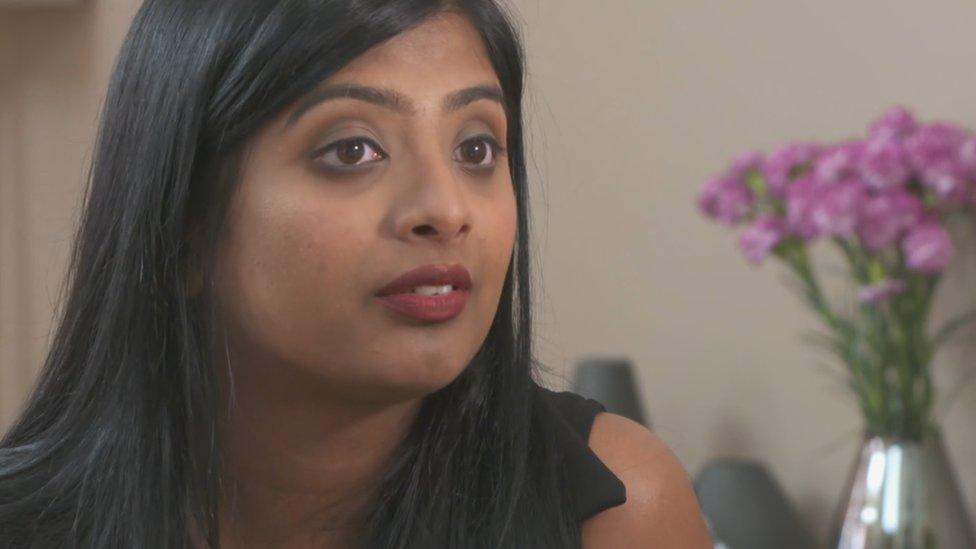'I was forced to marry my cousin'
- Published
Nyla Khan knew from a young age that she was "promised" to her cousin
Nyla Khan says she was taken from Scotland at the age of 17 and forced to marry her cousin in Pakistan.
"I knew from a very young age that I was promised to my cousin and I always felt very uncomfortable about that," she tells BBC Scotland's The Nine. She says she thought it was "morally wrong".
Nyla, who is now 30, had a "really strict upbringing" in a Mirpuri Muslim family.
"My parents were very paranoid about me becoming Western," she says. "They think they are protecting you."
Nyla says she wanted to "have a voice", express herself, dress differently and get "more from life" but extended family members complained she was "out of control".
"It was seen as being too Western," she says.

Nyla said it felt like her soul had left her body when she was forced to marry her cousin
At the age of 17, she was taken to Pakistan and woke up to find her whole family in her room.
"They started saying 'you have sinned', 'you need to marry your cousin now'," she says.
"They said 'you've brought shame on the family and the only way you can fix this is if you get married'."
It is like your soul leaves your body because you become so numb because you have absolutely no power of control over what is happening
Nyla refused but she says they begged her "non-stop" and eventually she felt forced to give in.
She says: "I just wanted them to shut up. I just wanted them to be quiet.
"From there on it is like your soul leaves your body because you become so numb because you have absolutely no power of control over what is happening."
'Packed my bags'
After five weeks in Pakistan, the family came back to Scotland, without her new husband, who was going to travel on later. A couple of months after that Nyla ran away to stay with a friend.
"I packed my bags and I ran," she says.
"I did it for a year. I got a lot of abuse from family members, from extended family members, friends and community members," Nyla says.
"I would walk down the road and they would call you 'slut' or something."
Nyla says she was told she would never see her brother and sister again.
She says: "It is like everyone that was your world says 'we don't want anything to do with you'."
'Independent Muslim woman'
After a year she went back home "completely broken" and in tears.
Nyla says the community could not believe that her parents took her back after what she had done.
"It was hard but we worked through it. We put love before religion," she says.
Nyla got a divorce and went on to study social work at Robert Gordon University in Aberdeen.
"I have been an independent Muslim woman ever since," says Nyla, who now lives in Edinburgh.
Greater awareness
Forced marriage is a criminal offence. It occurs when one or both spouses do not consent to the marriage and violence, threats or coercion is involved. Coercion can include emotional force, physical force or the threat of it, and financial pressure.
The latest figures from the UK government's Forced Marriage Unit (FMU) show they gave advice or support to a possible forced marriage in 1,764 cases last year - a 47% rise.
The number in Scotland rose from 18 in 2017 to 30 last year.
The FMU said the increase in cases could be down to greater awareness of forced marriage being a crime and an improved data recording process.
The unit dealt with cases relating to many countries but Pakistan accounted for 44% of cases in 2018.
A Scottish government spokeswoman said it had published statutory guidance on forced marriage and was looking at "refreshing" this in conjunction with members of the Forced Marriage Network - a group drawn from a broad selection of public sector and third sector bodies, and community based organisations.
Nyla says: "I don't think we have found the proper solution yet. Education is the key, obviously, awareness is the key but I think parents need to understand how much pain your daughter goes through when you are forcing her into a marriage.
"I think people need to understand the impact it has emotionally, physically, spiritually on a woman when they are forced into a marriage."